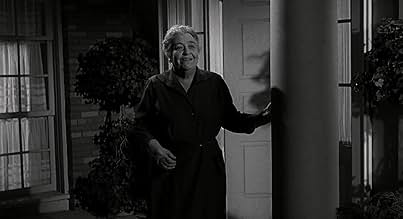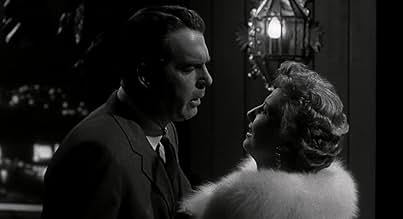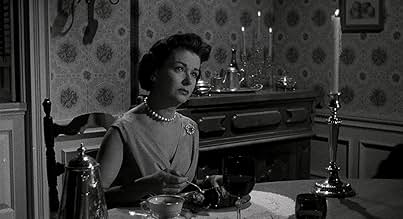IMDb RATING
7.4/10
4K
YOUR RATING
When a toy manufacturer feels ignored and unappreciated by his wife and children, he begins to rekindle a past love when a former employee comes back into his life.When a toy manufacturer feels ignored and unappreciated by his wife and children, he begins to rekindle a past love when a former employee comes back into his life.When a toy manufacturer feels ignored and unappreciated by his wife and children, he begins to rekindle a past love when a former employee comes back into his life.
- Director
- Writers
- Stars
- Director
- Writers
- All cast & crew
- Production, box office & more at IMDbPro
Featured reviews
Stylish drama acted expertly by super professionals. The powerful duo of Stanwyck and MacMurray excel when paired together and this is a fine example of that. Sadly this film is somewhat obscure, a shame since it really does examine in simple terms the crisis a man faces when he realizes he has fallen into a rut without being aware of it. Another winner from Sirk and perhaps even better then some of his more renown films, which are certainly enjoyable if sometimes over the top and a little lurid, since this drama is muted and closer to real life. The problems the film examines seem rooted in the 50's consumerism but by looking a little deeper they are revealed to be universal and timeless issues. This was the final pairing of Barbara and Fred, all their collaborations are worth watching, although The Moonlighter is rather sketchy, but this is the only one showing them as a mature pair and it's a pity they didn't have a chance to make perhaps one more when they had reached old age since they brought out the best in each other.
I can not stand Vinny's character. He is so "full of himself." The youngest daughter Frankie drove me crazy with her whining!
Excellent performances by Stanwyck, MacMurray, and Bennett. This is one of the last movies Stanwyck and MacMurray made together, she was as beautiful in this movie as in any of her 1940's movies. She's timeless and such a wonderful actress. For those of you who really like Fred, and want a real treat... Check out the movies "Miracle of the Bells," and "Suddenly it's Spring!" Fred Mac Murray and Barbara Stanwyck were such underrated actors/actresses of their time. Joan Bennett plays her part so well you understand why the household is the way it is. Great love story, if you can get through the kids!
Excellent performances by Stanwyck, MacMurray, and Bennett. This is one of the last movies Stanwyck and MacMurray made together, she was as beautiful in this movie as in any of her 1940's movies. She's timeless and such a wonderful actress. For those of you who really like Fred, and want a real treat... Check out the movies "Miracle of the Bells," and "Suddenly it's Spring!" Fred Mac Murray and Barbara Stanwyck were such underrated actors/actresses of their time. Joan Bennett plays her part so well you understand why the household is the way it is. Great love story, if you can get through the kids!
Pasadena toy manufacturer Fred MacMurray (as Clifford "Cliff" Groves) is wealthy and successful, but feels neglected by his busy family. His children are preoccupied with their own lives and loving wife Joan Bennett (as Marion) always finds herself committed to something other than time with Mr. MacMurray. He feels ignored, unappreciated and lonely. Enter former employee Barbara Stanwyck (as Norma Miller-Vale). Formerly plain, but now an attractive dress designer, Ms. Stanwyck arrives in Los Angeles on business. She's clearly interested in rekindling something with MacMurray...
The best part here is that "There's Always Tomorrow" has director Douglas Sirk working in the 1950s, with his best photographer Russell Metty. This means artful shadows, stairways, windows and reflections. Such visuals, especially as they complement the story, are great. There is even a scene with Stanwyck's face shedding tears that are actually reflected raindrops; a technique said to have originated with "In Cold Blood" (1967). Quite possibly, this was done even earlier...
The cast is strangely unimpassioned. MacMurray and Stanwyck lack the level of spark they conveyed in previous collaborations. Perhaps this is the point. MacMurray has become like the toy robot he created. He's "Rex" the walkie-talkie mechanical man. Stanwyck appears to be hesitating an attempted seduction. While not the protagonist, she becomes the most interesting character. Completely and most maddeningly in the dark, Ms. Bennett acts robotically unaware of the threat to her supposedly perfect family life. Shaking things up is suspicious and literate son William Reynolds (as Vinnie).
******* There's Always Tomorrow (1/20/56) Douglas Sirk ~ Fred MacMurray, Barbara Stanwyck, Joan Bennett, William Reynolds
The best part here is that "There's Always Tomorrow" has director Douglas Sirk working in the 1950s, with his best photographer Russell Metty. This means artful shadows, stairways, windows and reflections. Such visuals, especially as they complement the story, are great. There is even a scene with Stanwyck's face shedding tears that are actually reflected raindrops; a technique said to have originated with "In Cold Blood" (1967). Quite possibly, this was done even earlier...
The cast is strangely unimpassioned. MacMurray and Stanwyck lack the level of spark they conveyed in previous collaborations. Perhaps this is the point. MacMurray has become like the toy robot he created. He's "Rex" the walkie-talkie mechanical man. Stanwyck appears to be hesitating an attempted seduction. While not the protagonist, she becomes the most interesting character. Completely and most maddeningly in the dark, Ms. Bennett acts robotically unaware of the threat to her supposedly perfect family life. Shaking things up is suspicious and literate son William Reynolds (as Vinnie).
******* There's Always Tomorrow (1/20/56) Douglas Sirk ~ Fred MacMurray, Barbara Stanwyck, Joan Bennett, William Reynolds
Fred MacMurray, Barbara Stanwyck, and Joan Bennett star in "There's Always Tomorrow," directed by Douglas Sirk and featuring William Reynolds, Gigi Perreau, Judy Nugent, and Pat Crowley as the young people.
MacMurray is a successful toy developer, Clifford Groves, married to Marion (Bennett), and they have three children (Reynolds, Perreau, and Nugent). Marion is preoccupied with the kids and the household, while MacMurray is longing for some alone time with her and to do something different - take a weekend off, go to the theater -- but something always happens that prevents it.
When Marion can't make a theater performance because of their daughter's dance recital, Cliff stays home alone. A woman who once worked for him, Norma Vale (Stanwyck) comes over to say hello. She's now a successful dress designer in from New York. He takes her to the theater instead, and then she asks to see his office.
When a planned weekend in the desert with Marion doesn't work out because one of the girls breaks her ankle, Marion insists that Clifford go without her and relax. There, he runs into Norma again. Unfortunately, his son (Reynolds) shows up and thinks Cliff and Norma are involved. He and his friends leave without making their presence known to his dad. Without realizing what's happening, Cliff is falling for Norma; and he doesn't know that she's always been in love with him.
This is a midlife crisis, '50s style, with the underpinning of the grass is always greener. That wasn't the original intention, of course - the original intention of the film is that Norma is lonely and would give up her wonderful career to have a family like Marion and Cliff have. People still feel this way, but today, it's more because of the road not taken, not so much because of dissatisfaction. Nothing's perfect, as the film shows us. Cliff sees Norma's freedom, the attention she pays him, her interest in his work. He feels in fourth place behind the kids to Marion. He's sick of being like the robot that is his latest toy. You wind him up, he works, he comes home, he has dinner, he goes to bed. With Norma he sees an opportunity for something different. Youth. To be put first. Endless possibility.
What a lovely movie, and I thought I was sitting down to some second feature. Instead, it has Sirk's magic touch and his sly criticism of the picture-perfect '50s American life. Frankly, I could have slapped the kids and Marion for not seeing what's in front of their faces, but to be fair, kids are self-involved, and Marion is completely committed to doing what she thinks is important for Cliff and their family.
Wonderful acting, with MacMurray as the frustrated Everyman, Bennett as an attractive, disciplined woman, and Stanwyck has someone who has earned wisdom the hard way, through hard work and disappointment.
Highly recommended.
MacMurray is a successful toy developer, Clifford Groves, married to Marion (Bennett), and they have three children (Reynolds, Perreau, and Nugent). Marion is preoccupied with the kids and the household, while MacMurray is longing for some alone time with her and to do something different - take a weekend off, go to the theater -- but something always happens that prevents it.
When Marion can't make a theater performance because of their daughter's dance recital, Cliff stays home alone. A woman who once worked for him, Norma Vale (Stanwyck) comes over to say hello. She's now a successful dress designer in from New York. He takes her to the theater instead, and then she asks to see his office.
When a planned weekend in the desert with Marion doesn't work out because one of the girls breaks her ankle, Marion insists that Clifford go without her and relax. There, he runs into Norma again. Unfortunately, his son (Reynolds) shows up and thinks Cliff and Norma are involved. He and his friends leave without making their presence known to his dad. Without realizing what's happening, Cliff is falling for Norma; and he doesn't know that she's always been in love with him.
This is a midlife crisis, '50s style, with the underpinning of the grass is always greener. That wasn't the original intention, of course - the original intention of the film is that Norma is lonely and would give up her wonderful career to have a family like Marion and Cliff have. People still feel this way, but today, it's more because of the road not taken, not so much because of dissatisfaction. Nothing's perfect, as the film shows us. Cliff sees Norma's freedom, the attention she pays him, her interest in his work. He feels in fourth place behind the kids to Marion. He's sick of being like the robot that is his latest toy. You wind him up, he works, he comes home, he has dinner, he goes to bed. With Norma he sees an opportunity for something different. Youth. To be put first. Endless possibility.
What a lovely movie, and I thought I was sitting down to some second feature. Instead, it has Sirk's magic touch and his sly criticism of the picture-perfect '50s American life. Frankly, I could have slapped the kids and Marion for not seeing what's in front of their faces, but to be fair, kids are self-involved, and Marion is completely committed to doing what she thinks is important for Cliff and their family.
Wonderful acting, with MacMurray as the frustrated Everyman, Bennett as an attractive, disciplined woman, and Stanwyck has someone who has earned wisdom the hard way, through hard work and disappointment.
Highly recommended.
Sirk aptly deals with basic family values and problems in a critical way, questioning the false appearance of stability and harmony of a typical American home. MacMurray's job in a toy factory provides plenty of interesting metaphors, often visual ones. In one scene Sirk even places 'Rex, the Walkie-Talkie Robot-Man' on the foreground, upstaging MacMurray and forcing a comparison between them. MacMurray's home, under the resemblance of a happy and harmonious family life, really seems like a big doll's house MacMurray being here a sort of male 'Nora'. The happy ending seems a bit awkward or phony, but it's what audiences were taught to expect back in the 50's; no other ending would have been allowed under the infamous Production Code, then still being enforced.
Did you know
- TriviaAcclaimed documentary filmmaker Errol Morris named it as one of his 10 favorite films in the 2002 BFI Sight & Sound Poll.
- GoofsNear the end, Vinnie is telling his girlfriend that he was wrong "about Norma and Cliff" in these exact words. But Cliff is his father; he wouldn't refer to his father by his first name.
- Quotes
Norma Miller Vale: Love is a very reckless thing. Maybe it isn't even a good thing. When you're young and in love, nothing matters except your own satisfaction. The tragic thing about growing older is that you can't be quite as reckless anymore.
- ConnectionsFeatured in Perspectives sur la famille américaine (2008)
- SoundtracksBlue Moon
(uncredited)
Written by Richard Rodgers and Lorenz Hart
Played on one of the toys and heard as a theme throughout the film
- How long is There's Always Tomorrow?Powered by Alexa
Details
- Runtime
- 1h 24m(84 min)
- Color
- Aspect ratio
- 1.85 : 1
Contribute to this page
Suggest an edit or add missing content



































